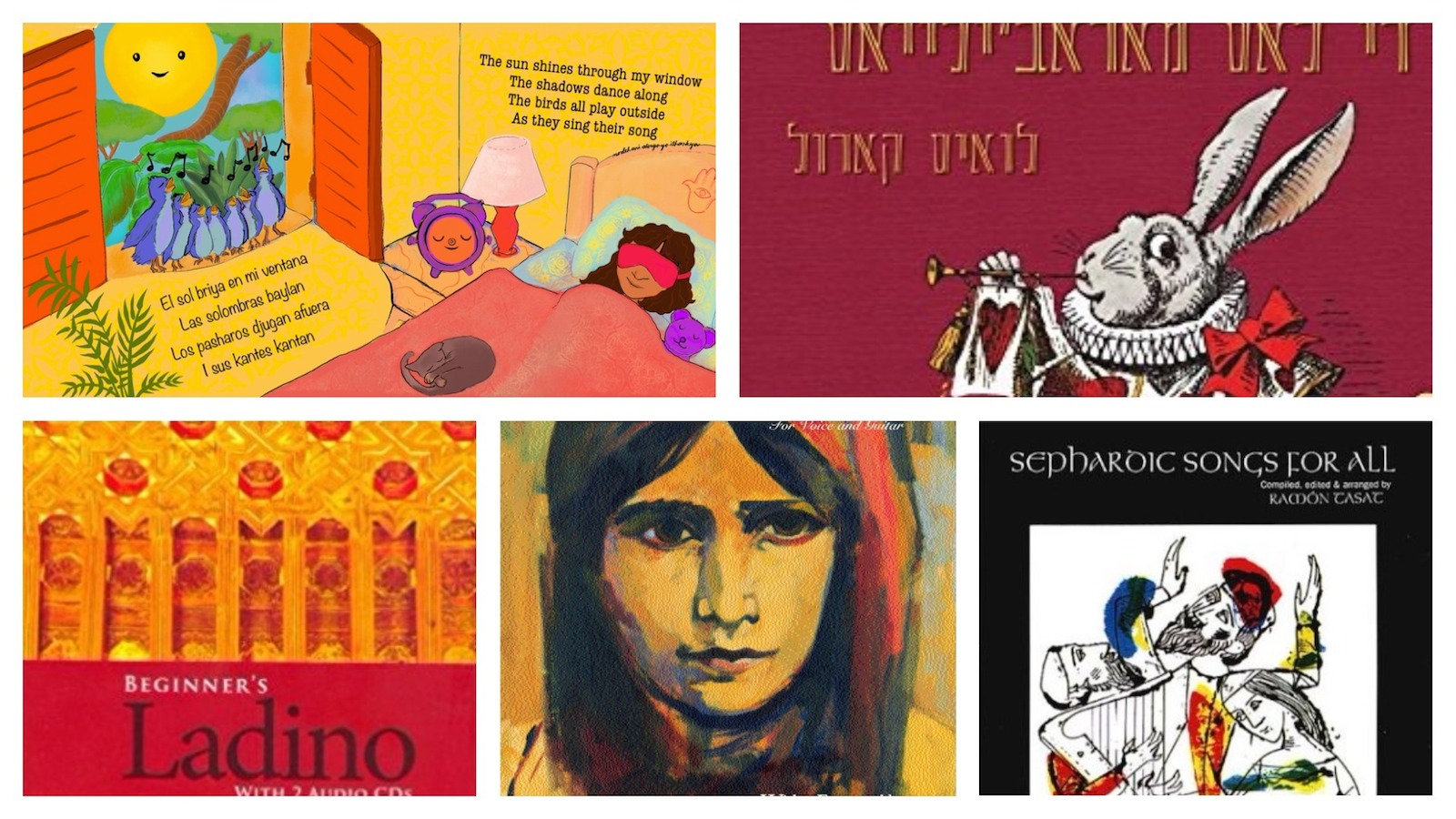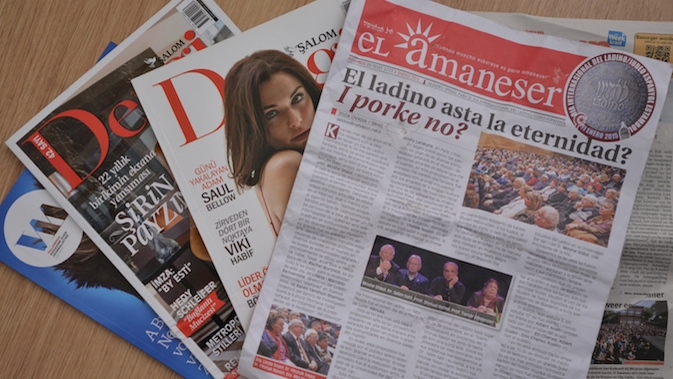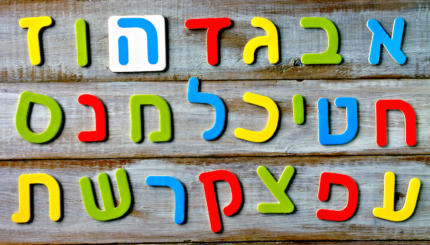Ladino, also known as Judeo-Spanish, was, from the Spanish Inquisition until World War II, the primary language spoken by thousands and thousands of Jews throughout the Mediterranean.
It is essentially 15th-century Spanish, with words mixed in from Portuguese, French, Italian, Arabic, Greek, Turkish and Hebrew — and it is rich with music, poetry, proverbs, folktales and more. Learn more about Ladino here.
My Jewish Learning is offer a six-part Ladino class during May, 2024. Register here.
While Ladino no longer is spoken anywhere as a first language and estimates put speakers with Ladino familiarity at just 200,0000 worldwide, there are a surprising number of resources available today for people committed to learning this language.

Help us keep Jewish knowledge accessible to millions of people around the world.
Your donation to My Jewish Learning fuels endless journeys of Jewish discovery. With your help, My Jewish Learning can continue to provide nonstop opportunities for learning, connection and growth.
I have used many of these resources first-hand, as I did not grow up speaking the language, myself. Here are some places to begin!
Notes Before You Get Started
Workbooks
Online Courses & Tutorials
Dictionaries
Resource Libraries
Beginner Books
Intermediate Books
Animated Videos
Music Songbooks
Movies with Ladino
Newspapers in Ladino
Ladino Radio
University Courses
Online Forums for Meeting Ladino Speakers
Ladino Speakers’ Social Groups
Notes Before You Get Started
- Many of these are non-traditional resources (animated cartoon series, music songbooks, Tom Hanks movies and more!).
- Ladino was first written in Rashi (or solitreo) script, then with Hebrew letters, and now primarily with Latin script. As a result, it has no universal spellings today. Most of the written resources below are those in Latin script, except where noted. I have not included Rashi or solitreo resources here.
- Do you speak Spanish? You might find learning Ladino can trip you up at first. While there are a lot of commonalities between the two languages, some Ladino words might seem antiquated and the syntax can seem odd to Spanish speakers. Certain consonants get flipped (d’s and r’s occasionally), and pronunciations can be strange. That being said, Spanish speakers do have a leg up learning the language and will likely have an easier time overall than those unfamiliar with Spanish.
- There are many terrific resources about Ladino or about history and culture. Those are not included here. Instead, the resources below are in Ladino, specifically to help learn the language itself. Most of these resources come with English translation or American-based learning opportunities, except where noted. It should be acknowledged that much is happening around the world — in Spain, Israel, Argentina and Turkey, in particular — to preserve Ladino, but the resources listed below are the most accessible from the United States.
- Did we miss anything? Feel free to add in suggestions of other relevant resources in the comments below or email community@myjewishlearning.com.
Workbooks
Beginner’s Ladino (includes 2 CDs) by Alla Markova
Manual of Judeo-Spanish: Language & Culture by Marie-Christine Varol
Course in Judeo-Spanish for Beginners by Matilda Koén-Sarano – You might have to search a library for this one, but if you can get your hands on it, it’s well worth it! In addition to this workbook, Koén-Sarano, one of the greatest Ladino writers today, has written several books of Ladino poetry and stories that are essential reading for studying the language. Her book, Ritmo antiko, poezías i kantigas, is one of my favorites.
Online Courses & Tutorials
Italki – One-on-one lessons via videoconference with a private Ladino teacher. ($30 per hour)
Kurso de Ladino (for Hebrew speakers): Thirty-seven Ladino video lessons put out by the Autoridad Nasionala del Ladino i su Kultura, Israel’s leading body for Ladino preservation. The content is in Ladino, but some of the spoken introductions and written descriptions are in Hebrew. (Free)
Autoridad Nasionala del Ladino i su Kultura YouTube Page– In addition to Ladino lessons (see the Kurso de Ladino above), this page also includes interviews with native Ladino speakers, and stories told exclusively in Ladino. (Free)
Memrise – Interactive beginner vocabulary lessons to complete on your computer or mobile devices. (Free)
uTalk – Learn more than 2,500 Ladino words and phrases from recordings of native Ladino speakers on this game-based app which works on smartphones, tablets and computers. uTalk Ladino can also be used by speakers of 100+ languages — including English — as the app automatically defaults to the language of your device. My Jewish Learning readers can receive a 50% discount at this link.
Dictionaries
Ladino-English/English-Ladino Concise Encyclopedic Dictionary by Dr. Elli Kohen & Kohen-Gordon (Ladino/English). This volume also includes a listing of some popular Ladino proverbs with English translations.
Diksionario Ladino-Ebreo/Ebreo-Ladino by Matilda Koén-Sarano (Ladino/Hebrew)
Gramatica Basica del Djudeo-Espanyol by Ferran Marin Ramon (Ladino/Spanish)
Ladino Resource Libraries
The National Sephardic Library and Archives (New York)
This is under the auspices of the American Sephardi Federation (ASF) at the Center for Jewish History, in New York City. This is one of the largest publicly accessible libraries and archives of Sephardic and Ladino interest in the Western Hemisphere. It contains books, documents, photographs, films and more.
Sephardic Studies Digital Library (Seattle)
This searchable collection at the University of Washington, Seattle, showcases one of the most comprehensive efforts to digitize all Ladino written materials — including novels, prayer books, Bibles, manuscripts and letters — and make them publicly available. It focuses on documents produced by Sephardic Jews between the 17th and mid-20th centuries, with a particular emphasis on materials in Ladino. There is also an audio collection.
MyLadino.com
This site, exclusively in Ladino, contains information about books, movies, famous Ladino-speaking figures, holidays, articles, recipes and much more. Speak Hebrew? The same website exists for Hebrew speakers and also includes links for language clubs and class offerings available in Israel here.
Beginner Books in Ladino
La Famiya Mozotros by Irvin Mandel is a book of illustrated cartoons in Ladino that reflect a humorous look at Sephardic life in Turkey today.
Ora de Despertar (Time to Wake Up) is a bilingual Ladino/English illustrated children’s book written by me (Sarah Aroeste) and illustrated by Miriam Ross that walks through morning gratitude rituals.
Aventuras de Alisia en el Paiz de las Maraviyas (Alice in Wonderland, in Ladino)
El Princhipiko (The Little Prince, in Ladino)
Nono’s Kisses for Sephardic Children by Flori Senor Rosenthal is a compilation of easy phrases in Ladino to discuss with children.
Intermediate Books in Ladino
Romansos en Judeo-Espanyol – short, romance stories in Ladino put out by El Sentro Sefaradi de Estambol, the leading organization to preserve Sephardic culture in Turkey. Each small pamphlet is under 30 pages and uses simple vocabulary.
El Kurtijo Enkantado by Matilda Koen-Sarano is a collection of Ladino short stories and folktales.
Animated Videos
Ora de Despertar (Time to Wake Up!)– is an animated musical cartoon collection developed by me, Sarah Aroeste, with easy-to-learn words teaching the elementals of Ladino. While it is intended for young children, it is also helpful for adults to be able to connect easy vocabulary and concepts with dynamic visuals. Watch the first episode below:
Ladino Music Songbooks
There are far too many beautiful Ladino singers to list here! iTunes, Spotify and all major music outlets have Sephardic playlists filled with Ladino music to explore. Classic singers and albums, if you can get a hold of their hard-copy CDs, will almost always have lyrics and translations included. I am listing here popular Ladino songbooks that have accompanying music CDs, which is a convenient way to learn the music and language at the same time:
The Flory Jagoda Songbook: Memories of Sarajevo
Judith Frankel: Sephardic Songs in Judeo-Spanish
Gerard Edery Sephardic Songbook
Ramon Tasat : Sephardic Songs for All
Movies with Ladino
The three motion pictures below are (at least partly) in Ladino, with subtitles.
Every Time We Say Goodbye (1986)
Starring none other than Tom Hanks, this film is about a gentile American in the Royal Air Force who is recuperating in Jerusalem after his bomber gets shot down during World War II. There he falls in love with a Sephardic girl and must navigate the cultural (and linguistic) differences with her Ladino-speaking family.
The House on Chelouche Street (1973)
Nominated for the Academy Award for Best Foreign Language Film, this movie tells the story of a Sephardic family from Egypt that settles in Tel Aviv in 1947. It is a vivid description of the lives of Sephardic immigrant families on the eve of the establishment of the state of Israel.
Stars (1959)
This winner of the Special Jury Prize at Cannes takes place in 1943 when a train carrying Greek Jews is headed for Auschwitz and stops in a small town in southwest Bulgaria. A love affair between a Nazi soldier and a Jewish girl ensues.
Newspapers in Ladino
El Amaneser
A monthly Ladino newspaper put out by the Ottoman-Turkish Sephardic Cultural Research Center, an organization for everything relating to Turkey’s Jewish communities.
Şalom Gazatesi
This Turkish Jewish newspaper has its own section in Ladino.
eSefarad
A news website about the Sephardic world, mostly in Spanish and Ladino.
La Boz Sefaradi
This weekly newsletter of the Sephardic Brotherhood, an umbrella group based in the United States that provides resources and cultural services for Sephardic Jews, publishes pieces of interest to the Sephardic world. Much is in English, but there are several sections in Ladino highlighting proverbs and folktales each week.
Ladino Radio
All of the stations below can be streamed directly from their websites.
91FM Radio Lev Hamedina
This Ladino music and story program is geared toward Hebrew speakers.
Radio Nacional de Espana (Spanish Public Radio)
This Spanish station has a Ladino broadcast, Emisión en sefardí.
Israel Broadcast Authority
This Israeli station has a daily Ladino newscast, Kan Ladino.
University Courses
Ladino is currently being taught at several universities in different styles (classes, seminars or student clubs). You might be able to audit and sit in on a class if it’s in a city near you! Here are a few for starters: University of Washington, Seattle, University of Pennsylvania, Binghamton University, UCLA, and all major universities in Israel.
Online Forums for Interacting with Ladino Speakers
Ladinokomunita
A Yahoo group correspondence circle exclusively in Ladino, with speakers from around the globe. The site also includes a working Turkish-English-Castilian-Ladino dictionary that you can find here. You could spend days exploring this site!
Sefardimuestro
A popular Yahoo forum where members communicate only in Ladino.
Facebook Groups
has several groups that are intended to be exclusively in Ladino, including Friends of Ladino (Hebrew/Ladino), Geon Sefarad (Ladino in Latin script) and Klub de elevos de Ladino Djudeo-Espanyol. There are many others if you search!
Ladino Speaker Social Groups
Vijitas de Alhad (Sunday visits)
What better way to practice Ladino than to seek out native Ladino speakers to chat with! This group meets in the Washington, DC area over food and stories. Other informal groups can be found in Boston, Seattle and other large cities.
Sephardic Synagogues
Congregations like Congregation Shearith Israel (the Spanish Portuguese Synagogue) in New York, or any of the Sephardic synagogues listed here (in Seattle, Florida, Atlanta, Indianapolis and more) offer resources and sometimes Ladino classes. They can also connect to you to native Ladino speakers in their community who might be willing to sit and talk with you!
Reushita buena ke tengas! May you have much success!




